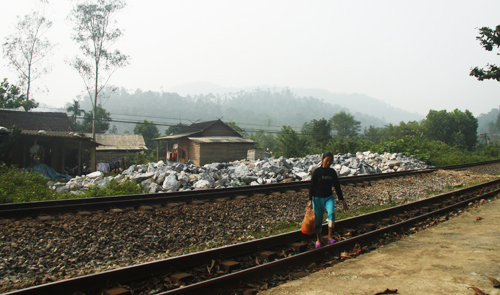Market trains in central and northern Vietnam now face an unknown future since authorities of the industry are thinking about halting the operation of the five trains which steadily incur large losses.
In terms of business, the trains must stop operations to cut losses, but in all other aspects, the state-owned railway industry ensures social welfare, especially in mountainous and remote areas where it is currently the only means of transportation.
The five market trains cause an average loss of VND100 billion (US$4.8 million) a year.
Nguyen Ngoc Le, director of the railway in the central province of Quang Binh, admitted, “The market trains have brought about great benefits for locals in remote areas, not in terms of profit, but in social welfare.”
“We can only stop the operation of the trains if we have other alternative means of transport,” he added.
One day on the market train from Yen Vien to Ha Long in the north at a distance of 164km, cashier Vu Ngoc Van said he collected a total fare of just VND2.2 million ($105). The train was made up of eight carriages for passengers and cargo.
He added the average fares of the train equal to just five percent of the total cost of operations.
The train is the only means of transportation for residents in remote districts Luc Nam, Yen Dung, Lang Giang, and Viet Yen in northern Bac Giang Province.
All market trains currently under operation in Vietnam are causing financial losses. The train with the highest profits travels from Hue to Dong Hoi. However, its fares meet only 22 percent of total costs.
Up in the air
Late last year, the railway authorities proposed that the Ministry of Transport halt operation of the five market trains, but soon after, authorities of the localities served by the market trains opposed the proposal.
The northern province of Lang Son even asked to increase the operation of the trains, said Tran Ngoc Thanh, chairman of the state-owned Vietnam Railways Corporation.
Thanh admitted that the business situation of the industry will be much better if the market trains stop operation, but the industry is working not only for profit but also for social welfare because it belongs to the state.
Nguyen Huu Tuyen, head of the business department of the corporation, said it is impossible to hike ticket prices because of the low living standards in the areas and the low quality of the trains.
Tuyen suggested that the provinces served by the subsidized market trains invest more in traffic infrastructure so that residents are less dependent on the trains.
In reality, many localities will be like isolated islands if the trains stop running, as they are not connected with any roads or waterways.






















































